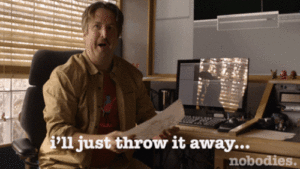
Alright, time to hold my hands up: I’m guilty. Guilty of once googling ‘best media cover letter examples’, and rearranging the words and details before sending it off to a prospective employer, hoping that I would emulate the success of this anonymous case study on a random recruitment site.
Did that application get a response? Did it heck.

Nobody enjoys writing a cover letter (well if you do, perhaps you should consider a new hobby), but it’s necessary that they are of a high standard. This is your chance to demonstrate why you are unique and tailor-made for a job – and using generic lines that every student and their dog uses will NOT make you stand out.
Instead, you should rack your brain for alternatives that are original. To get you started, here’s some examples of the buzz phrases in cover letters, and how to swerve them. Big time.
“I’m applying for [insert company/role here]”
Whatever you do, don’t do the ‘machine gun CV’ approach. In other words, your cover letter should be completely different for each role. Don’t just copy and paste the name of the company, and whack over your generic cover letter that you’ve used for 60 other potential roles.
What makes this role different to all the rest? An employer will be able to tell if you’ve thoroughly read the description. Mention things that the company or team have worked on that stood out to you to show them that you’ve researched!
“I’m think this is a great opportunity.”
Oh really? As opposed to just applying because you had nothing else better to do? Employers already know that they are offering an exciting opportunity. Obvious phrases like this just take up unnecessary space that you could use much more wisely.
Instead, detail why this role is intriguing to you. Summarise your career journey up to now, leading into why this prospective job is the ideal stepping stone for you personally.
“I’m great at XYZ.”

Context people, it’s all about context. Don’t just say you’re fantastic at time management, or that you’re super-organised. These sort of statements don’t mean jack without something to back it up.
Instead, perhaps discuss how you managed to balance your studies and extra-curricular work in university, and this is what proves your experience with time management. Even better, if you have professional experience, use that. Present the employer with facts, not wishy-washy claims.
“Outside-of-the-box” (or any other buzzwords/phrases)
Business jargon has a bad rep for a reason. If you use words and phrases such as this because you think an employer will be impressed, then let me be frank: they won’t be. Instead they’ll most likely be melting into a big pool of cringe, as they hear phrases like this in every weekly meeting.
Get creative with your language and show your own nuanced tone and style. There’s many ways to avoid phrases like the above, such as replacing it with words like “innovative”. And again as demonstrated before, give context for when you’ve lived up to adjectives such as these.
…just please, whatever you do, don’t use “groundbreaking”. Ugh.
“My skills include this, that, that other thing, that other other thing…”

Your CV is the place to detail your lists of skills. You’ll most likely even have a dedicated section on it. DON’T just rehash what you have in there on your cover letter. It’s fine to mention key skills that are crucial to the role, but don’t waste space by listing every PC skill you have in your arsenal.
Hone in on a few and give examples of when you’ve used them well. Ergo, if you used email marketing to send out a campaign, detail the system and mention the most popular edition that you ever sent out.
The main takeaways from each point here are that you should put in time and effort to your cover letter. Research the company beyond the job advert, show you have the skills to dig deeper and go above and beyond before you’ve even reached the interview stage.
And whatever you do, avoid lines like the ones mentioned above! Stick to that, and your cover letter will be stellar, I guarantee.
Download Debut and connect with us on Facebook, Twitter and LinkedIn for more careers insights.


